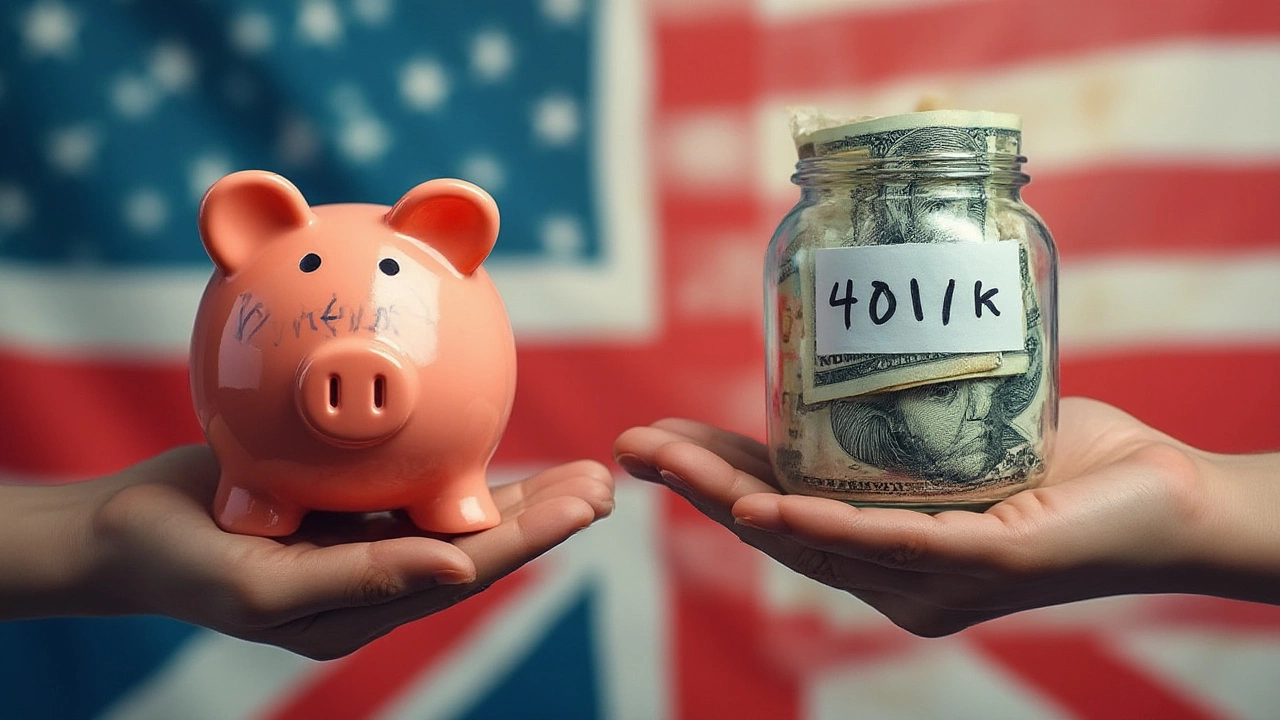If you think saving for retirement is confusing, you’re not alone. Someone once told me their plan was to win the lottery and skip all this money talk. Sounds fun, right? But for most of us, the reality is a little more down to earth. Ask ten people on the street to explain the difference between a pension and a 401k, you’ll probably get ten different answers—and maybe a few blank stares. Retirement plans change lives, yet the details can get muddy fast. Let’s clear that up. Pensions and 401ks may both be about building a nest egg, but they work in totally different ways, and your future self will thank you for understanding those differences.
How Pensions and 401ks Actually Work
First up, pensions. Picture this: you spend twenty or thirty years working for a company, and when you retire, they send you a check every month. That’s a pension for you—the old-school promise of a steady income after you stop working. With a traditional pension, also called a defined benefit plan, your employer pools together money, manages investments behind the scenes, and guarantees a set payout when you retire. The amount is usually based on your salary history and years on the job. Some big companies still offer them, and most government jobs do too—but if you’re in the private sector, a classic pension is starting to look like a unicorn. Less than 15% of private-sector jobs have them as of 2024 according to data from the Bureau of Labor Statistics.
Now let’s tackle the 401k. Instead of a guaranteed payment, a 401k lets you take charge of your future. You decide how much from each paycheck goes into your own investment account, often with help from your company in the form of matching dollars. It’s called a defined contribution plan—you put in a certain amount, pick investments from a list, and the rest is up to the market. There’s no set or promised payout; what you’ll end up with depends on how much you invest and how those investments perform. Over 70% of private-sector employees now have access to a 401k, making it the main way folks outside government save for retirement.
Pensions and 401ks have completely different vibes. Pensions are like set-it-and-forget-it, security-blanket comfort: pay your dues (usually a long time), then reap the reward. 401ks are more like a choose-your-own-adventure book: what you get depends on your choices, the market, and sometimes, a little luck.
Here’s a little cheat sheet to sum that up:
| Feature | Pension (Defined Benefit) | 401k (Defined Contribution) |
|---|---|---|
| Who funds it? | Mainly employer | You (with possible employer match) |
| Payouts | Guaranteed, based on salary & years worked | Not guaranteed, depends on contributions & investments |
| Investment risk | Employer bears it | You bear it |
| Flexibility | Limited; often not portable | Very; you can roll over if you switch jobs |
| Popularity in private sector | Declining | Very common |
When I first started working, honestly, I mixed them up myself. My wife, Hannah, got a job with a government agency and suddenly, talk at the dinner table switched to vesting schedules and pension tiers. It’s wild how the structure of your retirement plan can shape your financial story years down the road. For people who love the idea of a sure thing, pensions sound lovely. But the control, portability, and options of a 401k are hard to ignore—especially if you change jobs a lot, which studies show is more common than ever.

Pros and Cons: Security vs. Freedom
The classic pension and the 401k both have die-hard fans—and for good reason. Both give you tools for financial survival, but each has strengths and weaknesses that can surprise you.
If you land a pension, you’re basically scoring a slice of future paycheck security. Companies figure out how much you’ll get by mixing your salary and years worked into a formula. Stay at the company long enough to ‘vest’ (usually about 5 years, but it can be more or less), and you’ve locked in a predictable monthly paycheck after you retire. If the investment markets tank, it’s usually not your problem: the employer is on the hook to make up the difference. Many government jobs (think teachers, police, firefighters) and some labor unions use pensions. The tough part? If you leave before you’re vested, or if you change employers, you usually can’t take the pension with you. Plus, new pensions are becoming rare—unless you work in the public sector, don’t count on finding one easily.
Now, meet the agile 401k. Your future outcome is totally in your hands. You pick how much to save (up to $23,000 annually in 2025, plus an extra $7,500 if you’re over 50). You choose from a menu of investments: index funds, stocks, bonds, maybe some target-date funds. The good news? Many employers match part of your contributions—some up to 6%, giving you free money for your future. If you change jobs, you can roll over your 401k to a new one or an IRA, so your money follows you, unlike most pensions. The flip side? Your account rises or falls with the market, so the risk sits right on your shoulders. If you never pay attention, and the market hits a rough patch right as you retire, that could be rough. 401ks also tend to have more strings: loans, early withdrawal penalties, and sometimes high fees baked into certain investment choices.
Which is better? Depends how you look at it. Want set-it-and-forget-it security? Pensions win. Prefer flexibility and the thrill (and risk) of investing? 401k is your playground. Some lucky few get both—a pretty sweet deal. The average monthly payout from a private pension was about $1,400 in 2023, while the average 401k balance for people aged 65 and up was a bit over $232,000, according to Vanguard.
The hardest part? Neither is perfect. Pensions can vanish if a company goes bankrupt (though some benefits are protected by the Pension Benefit Guaranty Corporation, and there are limits). 401ks can dip hard if the market tanks just as you need the money. Either way, the best plan is one you actually understand and contribute to.

How to Make the Most of Your Retirement Plan
Navigating the retirement maze comes down to being a little proactive. Whether you’re banking on a pension, a 401k, or some wild combo like my brother (he churns jobs with the skill of a reality TV contestant), a few power moves work for everyone. Here’s how to stretch every dollar:
- Contribute early and often. With 401ks, time is everything. Even a couple years’ head start can mean tens of thousands by retirement. Start with whatever you can afford, then ramp up when you get raises.
- Snag every employer match. Don’t leave free money on the table. If your job matches up to 5%, hit that limit—even if it means cutting back elsewhere for a bit.
- Watch your investments. Don’t just pick random funds in your 401k and ignore it for 30 years. Check your risk levels as you get older—aim for more safe stuff (like bonds) the closer you are to retirement.
- With pensions, know your vesting schedule. Stay at the company long enough to lock in your future benefit. Sometimes you just need to ride out one more year to get the full amount.
- Understand your payout options. With pensions, you usually pick if you want monthly payments for life, or a lump sum (if offered). With 401ks, you get to decide when and how much to withdraw—though the IRS makes you start at 73 with required minimum distributions.
- Factor in Social Security. Most people will get it, but it won’t be enough alone. Blending it with a 401k or pension helps you cover more of your expenses.
I’ve seen friends get burned by missing a vesting deadline, or by ignoring high 401k fund fees and watching their nest egg get nibbled away—so it pays to keep an eye on the details. And don’t forget taxes: both pensions and 401ks generally get taxed as regular income when you withdraw, but with a Roth 401k, contributions go in after tax, meaning no tax bill in retirement (if you meet the rules).
Here’s something wild. Only about 56% of workers ages 26 to 41 (the heart of the Millennial crowd) have access to a retirement plan at work, according to the National Institute on Retirement Security. That’s a reminder that, whether you’re dreaming of Florida sunshine or just hoping to avoid cat food for dinner, building multiple streams of retirement income—401k, IRA, side gigs, maybe rental property—is smart. Don’t bank on one plan alone.
To wrap things up (without getting all formal), a pension and a 401k may look like twins from a distance—both meant for retirement—but they couldn’t be more different in how they work, who funds them, and what they promise. Knowing what you’ve got lets you play the retirement game on your terms. And if you’re ever not sure, reach out for help. I’ve called more than one HR department just to unravel the fine print. Your future self will thank you later.

